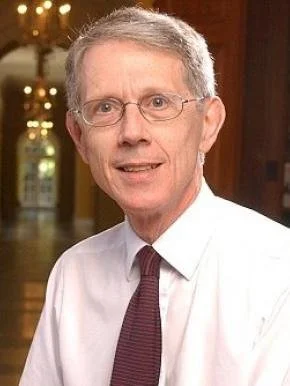A VIEW FROM ACROSS THE ATLANTIC
Marshall scholarships build a bridge
Sir David Manning, GCMG, KCVO
Sir David Manning, GCMG, KCVO served as the British Ambassador to the United States from 2003-07. He explains why he sees the Marshall Scholarship’s transatlantic network as more important than ever.
When I was the British Ambassador to Washington, one of the highlights of our year was the reception we gave for those who were about to leave to take up their Marshall Scholarships at universities in the UK.
I used to marvel at the extraordinary academic achievements and intellectual firepower of the young Americans who were leaving to spend two years studying in Britain. I used to read out some of their CVs in my welcoming speech to remind me, and impress upon the British guests we had included in the reception, just what an extraordinary cohort of talent and ambition the UK had been lucky enough to attract.
We were confident that these young American scholars would benefit greatly from studying at British universities, but we had no doubt that it was a two-way street. British universities, the British academic community, and British society more widely would in turn benefit greatly from having such exceptionally gifted American students in their midst. And because, almost uniquely among such schemes, the Marshall Scholarships last for two years rather than one, there is a real opportunity to forge enduring personal as well as professional links.
Many Marshall Scholars build friendships and networks with British counterparts that last a lifetime. These are links that really bind. The fact that the United States sends us some of its very brightest and best, sometimes in academic disciplines so esoteric and so cutting edge that they are baffling to laymen, creates an American/British transatlantic network that can be as influential as any transient political partnership or diplomatic treaty.
These are relationships based on common experience and common values, whether in law, the sciences, the humanities, journalism, or any of the other disciplines in which Marshall Scholars are pre-eminent. They bind our two countries together irrespective of individual personalities, passing fashions, or fluctuating politics. If the UK/US relationship is indeed “special,” the Marshalls are crucial in making it so.
This transatlantic network is more important than ever. The international outlook is uncertain and threatening. The global order based on the rule of international law, which is championed by the US, the UK, and their democratic partners and is the best hope of promoting and sustaining peace and prosperity, is threatened by the rise of autocracies and despotisms that operate on the basis that “might is right.”
Our own domestic politics, too, are challenged from within by those who are looking to erode the political guarantees that safeguard our individual freedoms. Our governments need to address such challenges urgently but, whatever policies they adopt politically and economically, they need the underpinning of the shared vision of political freedom, scientific progress, and international cooperation that lies at the heart of the Marshall mission.
Just as General Marshall understood the need to foster commitment to a common vision at the start of the Cold War, so we need to renew our commitment to one another as we confront the challenges that now face us.
The Marshall program is a vital bridge of transatlantic understanding and solidarity. It has served us wonderfully over the past 70 years, and we shall need it to serve us equally well in the next 70. When national budgets are tight and money is needed for everything from increased defense expenditure to health care, it can be difficult to persuade harassed ministers and treasuries to find the funding for scholarships. But that money is well spent. These scholarships provide the academic cross-fertilization that benefits both the US and UK in a wide range of research and development. By establishing lifelong links and a lifelong mutual commitment, they also underpin the health and success of our societies overall.
My plea is that the Marshall Scholarships should be recognized for their exceptional contribution, and that their funding should be put on the certain footing that will enable them to look confidently and creatively to the future. They are a tried and tested investment, one from which we enjoy exceptional returns.
Sir David Manning GCMG, KCVO joined the UK’s Foreign and Commonwealth Office in 1972 and served in Warsaw, New Delhi, Paris, and Moscow. From 1994-95, he was Head of Policy Planning; from 1995-98, Ambassador to Israel; and from 1998-2000, Deputy Under Secretary of State for Defence and Intelligence and a member of the Foreign Office Board. He was the UK Permanent Representative at NATO (Brussels) from 2000-01, & before returning to London as Foreign Policy Adviser to the Prime Minister and Head of the Defence and Overseas Secretariat (2001-03). He was then Ambassador to the United States for four years from 2003-07. Sir David is a Director of Gatehouse Advisory Partners, a nominated member of the Council of Lloyds of London, Chair of IDEAS at the London School of Economics, and a Patron of Afghan Connection and President of World Wide Volunteering.


